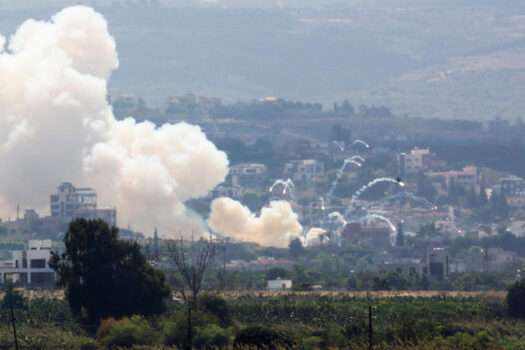
Israel launched a series of intense airstrikes on Hezbollah targets across Lebanon on Monday, marking the deadliest day in the country in nearly a year of ongoing conflict with the Iran-backed group. Lebanese health authorities reported that at least 182 people were killed, including women, children, and medics, with 727 others injured. The strikes came amid some of the heaviest cross-border exchanges between Israel and Hezbollah since hostilities flared up, as the conflict in Gaza escalates into the northern frontier.
Israeli Defense Minister Yoav Gallant warned that operations would continue until northern residents could safely return to their homes, signaling a prolonged conflict. He urged civilians in Hezbollah strongholds to evacuate, emphasizing that the airstrikes targeted areas where the group was allegedly storing weapons. “These are days in which the Israeli public will have to show composure,” Gallant said in a video released by his office.
The Israeli military confirmed it had struck over 300 Hezbollah targets, with attacks focused on southern Lebanon, the eastern Bekaa Valley, and northern regions near Syria. Rear Admiral Daniel Hagari, the Israeli army spokesperson, stated that the strikes were aimed at Hezbollah’s strategic weapons stored in residential areas. “In every house we are attacking, there are weapons – rockets, missiles, and UAVs meant to kill Israeli civilians,” Hagari said.
Hezbollah retaliated by launching rockets at Israeli military posts, with further clashes expected. The group has vowed to continue its fight until a ceasefire is achieved in Gaza, where Israel has been engaged in a nearly year-long conflict with Hamas.
Tensions escalated last week when Hezbollah suffered a major attack that destroyed thousands of communication devices, an operation widely attributed to Israel. Additionally, Israeli airstrikes in Beirut’s southern suburb on Friday killed 45 people, including senior Hezbollah commanders Ibrahim Aqil and Ahmed Wahbi.
The intensifying conflict has raised fears of a broader regional war, with Iran, a key supporter of Hezbollah, warning of “dangerous consequences” for Israel. The U.S., Israel’s close ally, is closely monitoring the situation amid concerns that the conflict could draw in more international actors.
Meanwhile, more than 80,000 evacuation calls have been detected across Lebanon, urging civilians to leave Hezbollah-controlled areas. Interior Minister Bassam al-Mawlawi announced that schools in several cities, including Beirut, would open as shelters for displaced citizens.
Lebanon, already grappling with a financial meltdown, faces the possibility of a full-scale war reminiscent of the 2006 conflict with Israel, which left the country in ruins. Lebanese officials, including Information Minister Ziad Makary, have dismissed the evacuation orders as “psychological warfare,” but residents are increasingly worried about the mounting violence.
Israel’s military has indicated that its air operations will continue, with ground forces ready if necessary. For many in Lebanon, the escalating strikes are seen as the beginning of a larger war, with fears that Hezbollah’s response could lead to even more devastation.

White House Says Military Option Open On Greenland Acquisition
Trump Calls Case Against Maduro “Infallible” Ahead Of U.S. Court Appearance
South Africa Raids U.S. Refugee Processing Centre, Arrests Seven Kenyans
Time Magazine Names AI Visionaries ‘Person of the Year’